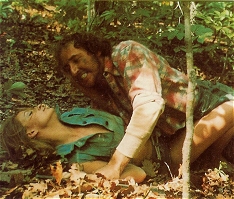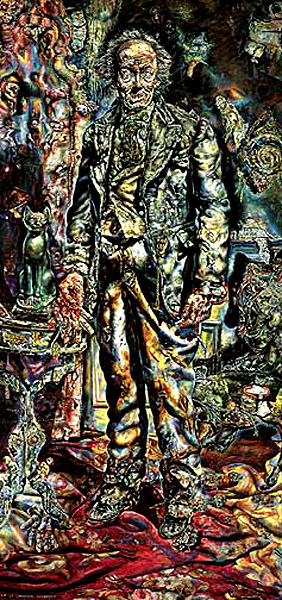By Nickolas Cook
Editor-in-Chief

As I age into myself a bit, I realize there’s a lot about horror that just doesn’t work for me anymore. I used to watch such atrocious shit as ‘Cannibal Ferox’, ‘I Spit On Your Grave’, ‘The Last House On the Left’, and the inevitable 80s sick-o ‘Faces of Death’ film series. Usually I did so with groups of like minded people, many of us simply doing so to fulfill a dare, or perhaps to prove nothing bothered us. We were a bunch of young toughs, devil may care, take life by the horns kind of film watchers. Maybe I did it because I wanted to see just how far down the cesspool some so called filmmakers will plumb to make a buck. Let’s face it: there is no redeeming value to something like ‘Cannibal Holocaust’. Sure, if you want to see animals tortured and killed for your fucking enjoyment, by all means pop up a bag of popcorn, get your sodas, and watch it happen. None of that is faked, folks. Those animals die for real. And in some cases they are tortured first, so you can get a good listen to their squeals of pain and confusion.
Some people I’ve encountered online in various web sites have argued that such filmmaking is the essence of guerilla filmmaking, that by showing such things the filmmakers are giving us the real thing.
Yeah, ok…right.

And as I’ve stated on those various online forums…bullshit.
What you are getting is some sick asshole’s desperate desire to make money. He is using shock value, allowing you to see something die before your eyes, to make a buck.
Now I won’t sit here and condemn a person for watching it the first time. After all, it’s there, and we are a curious-minded species. We want to know how things tick; in this case, how something really dies. There’s that sideshow freak kind of mentality involved in secretly wanting to see it happen.
But if you’re watching this crap again and again, rewinding to watch the animals’ deaths over and over, or even just actively seeking to see more of the same in other movies, then, brother, you are, in layman’s terms, one sick son of a bitch.
Yes, I have seen the movies, so I’m not trying to be a hypocrite here, but let’s face it, when you’re a kid, or even just a young adult, this sort of thing invariably does hold a sense of fascination for you, doesn’t it? But at a certain age digging this shit just isn’t in any form or fashion normal, my friend.
In this age modern age of internet porn, we have the ability to see, literally, some of the grossest, most depraved, acts ever committed on the human body (or in some cases by an animal to a human body). I mean, some of this stuff is damn near psychopathic in what we’re allowed to see. I will not go into detail here, but let’s suffice it to say, even if you wanted to see a real person eating pieces of a real person- while they are still alive, mind you- there are ‘for-real’ videos out there for you to watch.
I suggest you do NOT attempt to find them. Because, I am here to tell you, you cannot unsee what you see, friend.
I made the mistake once of watching a video of one of the numerous terrorist beheadings and it messed me up for about a year afterwards. I will never, to my dying day, forget the sounds that poor man made as they sawed through his neck. I don’t ever have to see such things again to know what they’ll do to me.
But back to my point with this rather judgmental sounding editorial (and forgive me if it insults you, but remember: this is only my opinion, not commandments from God, Jesus, or Buddha). As I grew older, I found such sick-o movies held absolutely no charm for me. And it’s not that I’ve turned into some smug stick-in-the-mud curmudgeon, cursing those dad-blasted young whipper-snappers. No, its simply this: I’m old enough to have seen some things in my life that make some glibly excused depiction of real life violence for the mere thrill of it seem mean and low down…inhumane, even. In a fictional narrative that sort of realistic depiction MUST HAVE MERIT and not be there simply for the sake of showing off some gore.
Of course, some readers are thinking right now- hey, Nick, you eat meat don’t you? Yeah, I do. But here’s the difference (and this should be pretty self evident, but I’ll say it anyway)—I didn’t go to the slaughterhouse to watch the animal die so I could eat it. I know where my steaks and chicken breasts come from, and it’s unfortunate that I feel I have to eat meat to survive, but the bottom line is: I didn’t have to watch the animal die for my own sustenance.
As stated in previous editorials (see last month’s, for instance), I grew up in the deep dark woods of Florida. We weren’t rich. We were sometimes dirt poor, which meant that if we didn’t kill it, we didn’t eat that night. So, yeah, I’ve had to kill to eat. I don’t have to now. I never enjoyed it when I was a kid, and I sure as hell wouldn’t enjoy it now. I have no desire to kill for enjoyment.
If you do, that’s your business; but arguments about shooting a living thing just to see it die do not sit well within my own moral/ethical structure.
Another thing I’ve found as I’ve grown older: my sympathies for antagonists and protagonists have shifted.

Case in point: I just finished Oscar Wilde’s ‘The Picture of Dorian Gray’. If you’ve never read it, the short description is that a young man, Dorian Gray, of high society London allows himself to be painted by a friend. The painting is so accurate that he bemoans the fact he must age and the painting stay young. He makes a seemingly frivolous wish that the painting change while he remains young and untouched by life’s inevitable experiences. As the years go on, Gray seeks more and more depraved activities to keep himself satisfied, and even though he does some rather despicable things to get his jollies (maybe watching ‘Cannibal Ferox’ was one) he is never satisfied. And he never seems to age. He discovers his wish has come true as the painting he has hidden in the attic of his home (a little psychology from good old Wilde, eh?) is becoming more hideous with each new terrible thing he does.
When I was a younger man, I felt nothing but sympathy for young Gray. I knew what he must feel inside: he wanted to live life, not back down from any new experience, no matter how dark and depraved. I wanted his painter friend, Basil Hallward, to stop fucking whining and pushing Gray to become a better person. What could he know about it? Just because he was scared to try anything new. And I felt indifference for the driving engine of the narrative, Lord Henry Wotten. He was a smart ass at best and not much to think on.
Well, at forty, boy, have my emotions on the story changed.
Now, I loath Gray. He is a weakling who deserves every shitty thing that happens to him and it’s a shame it doesn’t happen sooner. Lots of innocent people would have lived.
As for Basil: I finally understood his speeches, his entreaties to Gray to shape up or prepare to face the consequences.
But the biggest shift is with Lord Henry.
At age forty, I feel sorrow for him. He is aging and does nothing but pine for his lost youth, while grasping desperately to find something or someone he can love. In the course of the story we find that Lord Henry is married to a woman for whom he has no emotion, has no parents, no children, in fact, has nothing but his charm and razor sharp wit and insults. People don’t really like him, but like to hear him defame their peers. In short, Lord Henry becomes what most famous people become: bitter, worthless in the eyes of an ever youthful society, and finally alone.
It’s no accident that I chose ‘The Picture of Dorian Gray’ to talk about after speaking to the sick-o shock movies of the 70s and 80s. Such a time could create such movies for an audience looking for the next thrill, no matter the cost. But I often find myself wondering how much our culture’s hidden portrait might have changed…you know…sitting up in that attic room, that dank, dimly lighted, cobwebbed space. While our culture demands youth worship, somewhere that portrait is dripping and changing in some strange Protean way, and the evil shit we’re doing now to get that next thrill-hit is lighting somewhere. Even our horror culture is becoming less and less able to release pressure through those time honored cathartic valves.
I’m convinced Wilde was writing a warning, whether he knew it or not. But it’s a warning that stands not only for an individual man’s experience, but for a society as a whole.
We should truly worry about that wee attic room and that shifting portrait because the bill’s going to come due someday, just like it did for stupid, vain Dorian Gray. And like Gray, I don’t think we know when to stop.

--Nickolas Cook
